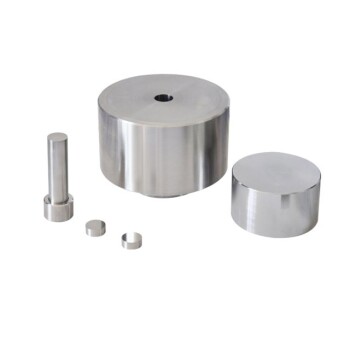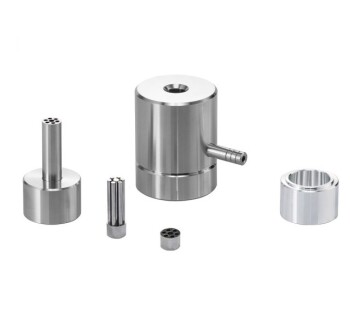In short, precise temperature control is critical in lab presses because it is the only way to guarantee consistent, repeatable results and prevent the degradation of sensitive materials. Without it, the integrity of your experiment or the quality of your final product is fundamentally compromised.
Poor temperature control introduces an uncontrolled variable that can invalidate your entire experiment. Precision isn't a luxury; it's the foundation of reliable scientific work and high-quality material processing.

Why Temperature Deviations Undermine Your Work
In materials science, polymer processing, and pharmaceutical development, temperature is not just a setting—it's an active ingredient in the process. Even minor fluctuations can have significant consequences.
To Prevent Material Degradation
Many advanced materials have a very narrow processing window. Polymers, composites, and pharmaceutical compounds can be permanently damaged if the temperature is too high, or fail to cure or form correctly if it is too low.
Precise control ensures the material is held at its optimal temperature, preventing molecular breakdown and preserving its intended chemical and physical properties.
To Ensure Consistent Sample Properties
Temperature directly influences viscosity, flow, and crystallization rates. Inconsistent heat across the platens or fluctuations over time will create samples with non-uniform density and internal stress.
This leads to unreliable data in a research setting and defective parts in a production context. Uniform temperature distribution is essential for creating homogenous, predictable samples.
To Guarantee Repeatability
The core of scientific research and quality control is repeatability. An experiment is only valid if you or another researcher can reproduce it and get the same result.
A lab press with imprecise temperature control makes this impossible. If the press cannot reliably hit and hold the same temperature profile every time, you cannot be certain if a change in outcome is due to your experimental parameters or the unreliable equipment.
The Technology Behind Precise Control
Modern lab presses employ a combination of hardware and software to achieve the high level of thermal precision required for demanding applications.
Integrated Heating Elements
High-performance presses feature heating elements specifically designed and integrated directly into the platens. This design ensures the most efficient heat transfer and promotes uniform temperature distribution across the entire surface.
Microprocessor-Based Control
The brain of the system is a microprocessor-based controller. It uses advanced algorithms and high-sensitivity sensors (like thermocouples) to constantly monitor the platen temperature.
This allows for immediate and minute adjustments, maintaining the setpoint with extreme accuracy throughout the heating, pressing, and cooling cycle.
Advanced Heating Profiles
Leading presses utilize features like pulse heating and multi-stage temperature control. This allows operators to program specific heating ramps and dwell times tailored to a material's unique requirements.
Real-time temperature curve displays provide visual confirmation that the press is following the programmed profile, giving the user complete oversight and control.
Understanding the Consequences of Imprecision
Investing in a high-precision press is often a decision to mitigate risk. The consequences of using equipment with poor temperature control can be costly and undermine an entire project.
Inaccurate and Invalid Data
If the temperature displayed is not the true temperature of the platen, any data collected is built on a false premise. Your conclusions will be inaccurate, leading to flawed research papers or poor manufacturing decisions.
Wasted Time and Materials
Each failed experiment or rejected sample due to thermal-related defects represents a direct loss of valuable materials and, more importantly, a researcher's time.
Inability to Scale or Transfer a Process
If you develop a process on a lab press with poor temperature control, you will be unable to reliably transfer that process to another machine or scale it for production, as the thermal conditions cannot be accurately replicated.
Matching Precision to Your Application
The level of precision you need is directly tied to your goal. Use these guidelines to make an informed decision.
- If your primary focus is fundamental research or new material development: You require the highest possible precision and uniformity to eliminate temperature as an uncontrolled variable and ensure your data is defensible.
- If your primary focus is quality control or process verification: Your goal is repeatability, so a press with demonstrably stable and consistent temperature control is non-negotiable for comparing batches.
- If your primary focus is processing less-sensitive materials: While sub-degree precision may not be necessary, uniform heat distribution across the platens remains critical to prevent weak spots or other defects in the final product.
Ultimately, choosing a lab press with the appropriate level of temperature precision is a foundational step toward achieving reliable and valuable outcomes.
Summary Table:
| Aspect | Impact of Precision |
|---|---|
| Material Integrity | Prevents degradation and preserves properties |
| Sample Uniformity | Ensures consistent density and reduces defects |
| Repeatability | Enables reliable reproduction of experiments |
| Data Accuracy | Eliminates uncontrolled variables for valid results |
Upgrade your lab's capabilities with KINTEK's precision lab presses!
KINTEK specializes in advanced lab press machines, including automatic lab presses, isostatic presses, and heated lab presses, designed to deliver superior temperature control for consistent, repeatable results. Whether you're in materials science, polymer processing, or pharmaceutical development, our equipment ensures your experiments and productions are reliable and efficient.
Don't let temperature inconsistencies compromise your work—contact us today to discuss how our solutions can meet your specific laboratory needs and enhance your outcomes!
Visual Guide

Related Products
- Automatic High Temperature Heated Hydraulic Press Machine with Heated Plates for Lab
- Manual Heated Hydraulic Lab Press with Integrated Hot Plates Hydraulic Press Machine
- Laboratory Manual Heated Hydraulic Press Machine with Hot Plates
- Heated Hydraulic Press Machine with Heated Plates for Vacuum Box Laboratory Hot Press
- Automatic Heated Hydraulic Press Machine with Hot Plates for Laboratory
People Also Ask
- What is the role of a hydraulic press with heating capabilities in constructing the interface for Li/LLZO/Li symmetric cells? Enable Seamless Solid-State Battery Assembly
- Why is a hydraulic heat press critical in research and industry? Unlock Precision for Superior Results
- What role does a heated hydraulic press play in powder compaction? Achieve Precise Material Control for Labs
- How does using a hydraulic hot press at different temperatures affect the final microstructure of a PVDF film? Achieve Perfect Porosity or Density
- What is the core function of a heated hydraulic press? Achieve High-Density Solid-State Batteries



















